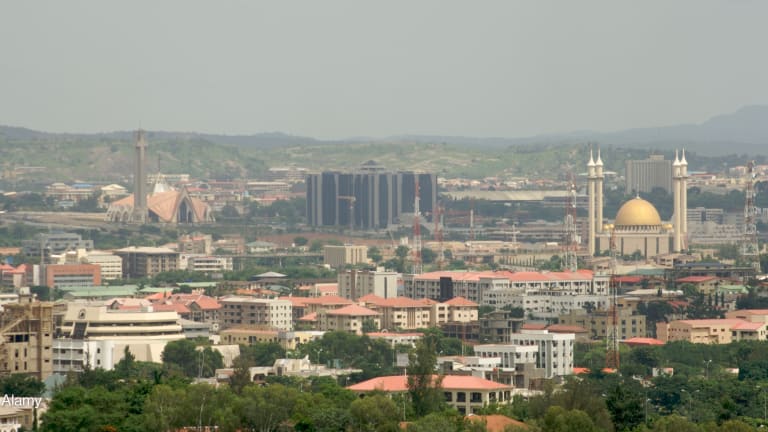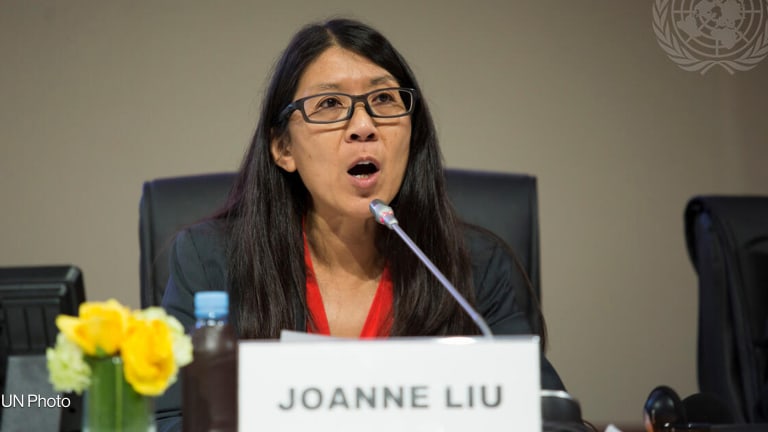7 ways Conservatives transformed foreign aid
As Canadians head to the polls next month to elect a new a new government, Devex takes a look at the most striking actions and policies taken by Prime Minister Stephen Harper.
Canadians head to the polls on Oct. 19 to elect a new government. After nine years of Conservative leadership, with two minority governments, then a majority from 2011, polls show the balance of power could shift in favor of the New Democratic Party or the Liberals. This would signify the end of a decade marked by dramatic shifts in terms of Canada’s stance on international affairs, with increased military involvement, disengagement from multilateral organizations and a considerably reduced foreign aid budget, among other changes. Devex takes a look at the most striking actions and policies taken by Prime Minister Stephen Harper. 1. Froze foreign aid spending. Canada’s aid budget dropped to 0.24 percent of its gross domestic product in 2014, reaching its lowest point since 1996. The total official development assistance in 2013-14 was 4.7 billion Canadian dollars ($3.56 billion). In 2010, the government scheduled a five-year freeze on foreign aid, but this year’s federal budget revealed the measure will be extended for another two years. Harper has repeatedly ignored calls from the United Nations to reach the 0.7 percent of GDP target, stating instead that Canada’s focus in on funding programs that produce results. More concerns were raised last year when it was revealed that the newly amalgamated Department of Foreign Affairs, Trade and Development had closed the 2013-14 with 125 million Canadian dollars in unspent foreign aid funds. Critics speculated the move was part of a plan to help the Conservatives secure a budget surplus in time for this year’s election campaign. 2. Abolished CIDA. An omnibus bill voted by Parliament in 2013 to implement the federal budget revealed unexpected plans for the amalgamation of the long-standing Canadian International Development Agency with the Department of Foreign Affairs and International Trade. A new department, DFATD, was created to ensure greater policy coherence between diplomacy, trade and development. Critics say this coherence has yet to benefit development programming, and worry that placing employees with no experience in development in executive positions will hurt the country’s foreign aid objectives. 3. Committed to maternal, newborn and child health. Under the Harper’s leadership, the G-8 launched the Muskoka Initiative, which committed member nations to spend an additional $5 billion between 2010 and 2015 to improve maternal, newborn and child health. Canada has allocated a total of CA$6.35 billion to MNCH from 2010 to 2020, with most financing going to African countries — a recent analysis of DFATD spending revealed Canada actually surpassed its commitment for 2010-2015 — while supporting additional initiatives against forced marriage and sexual violence. While the focus on MNCH will likely be remembered as Harper’s signature development initiative, its success has been tampered by reduced funding for sexual and reproductive rights programs, and a ban on funding for safe abortion services. Recent reports allege that an emphasis on short-term programming is preventing the initiative to be fully effective. 4. Altered the government’s relationship with CSOs. In 2010, then-Minister of International Cooperation Bev Oda announced the end of CIDA’s institutional partnerships with civil society organizations. Funding would now be allocated through calls for proposals from the government, but with no general calls for proposals having been launched sine 2011, funding has been increasingly difficult to secure. The relationship between the government and civil society organizations deteriorated again after several environmental and rights-based organizations that had been critical of the government were defunded. Recent audits of charities conducted by the Canadian Revenue Agency further fuelled what some have called an “intimidation campaign.” A new partnership with CSOs launched earlier this year has been credited for substantially improving the dialogue between the ministry of international cooperation and development organizations. 5. Reduced Canada’s support to the UN. Canada’s support to peacekeeping, but Harper has been blamed for failing to revert this trend. Once a top contributor to peacekeeping missions, Canada now only keeps a few dozen military personnel serving with the U.N., while remaining on the top 10 list of financial contributors. Its contribution to U.N. agencies such as UNICEF and U.N. Development Program has fallen, and in 2013, Canada ended its funding to U.N. Relief and Work Agency. Under Harper, the country has refused to sign the Arms Trade Treaty, and pulled out of the Kyoto Protocol and the U.N. Convention to Combat Desertification. Earlier this year, an internal memo prepared for International Cooperation Minister Christian Paradis obtained by local media revealed that “Canada has no plan to apply the post-2015 agenda domestically.” 6. Cut down efforts to protect the environment. Greenhouse gas emissions have decreased under Conservative leadership, but Harper’s record in terms of fighting against climate change has come under heavy criticism, mostly after the country pulled out of the Kyoto Protocol in 2011. On a domestic front, Harper’s government substantially reduced support to national environmental protection programs and policies. It has also been accused of weakening the national debate around climate change by targeting environmental groups with audits performed by the Canada Revenue Agency, and preventing its scientists from speaking to the media. Canada, an oil-producing nation, is not on track to meet its target to reduce greenhouse gas emissions by 17 percent below 2005 levels by 2020. The country has set a new target, aiming at reducing emissions by 30 percent below 2005 levels by 2030. 7. Increased ties between development efforts and the extractive sector. In 2011, CIDA announced three pilot projects in partnership with Canadian mining companies and civil society organizations, to take place in mining-affected communities in Burkina Faso, Ghana and Peru. The projects were seen as promoting the interests of the companies, thereby contradicting a number of development principles. The branding of these initiatives as pilot projects suggested the government envisioned replicating this model in the future. The merger of CIDA with DFAIT two years later increased fears that Canada’s development assistance would be used to serve the country’s commercial interests, notably its mining industry. The new list of priority countries for development, unveiled last year, seemed to serve similar objectives, as it included countries where Canada has strong business interests, such as Mongolia. Check out more insights and analysis for global development leaders like you, and sign up as an Executive Member to receive the information you need for your organization to thrive.
Canadians head to the polls on Oct. 19 to elect a new government. After nine years of Conservative leadership, with two minority governments, then a majority from 2011, polls show the balance of power could shift in favor of the New Democratic Party or the Liberals.
This would signify the end of a decade marked by dramatic shifts in terms of Canada’s stance on international affairs, with increased military involvement, disengagement from multilateral organizations and a considerably reduced foreign aid budget, among other changes.
Devex takes a look at the most striking actions and policies taken by Prime Minister Stephen Harper.
This story is forDevex Promembers
Unlock this story now with a 15-day free trial of Devex Pro.
With a Devex Pro subscription you'll get access to deeper analysis and exclusive insights from our reporters and analysts.
Start my free trialRequest a group subscription Printing articles to share with others is a breach of our terms and conditions and copyright policy. Please use the sharing options on the left side of the article. Devex Pro members may share up to 10 articles per month using the Pro share tool ( ).
Flavie Halais is a freelance journalist based in Montreal, Canada, covering international issues and cities through a social lens. Her work has appeared in WIRED, the Guardian, Le Monde Afrique, Jeune Afrique, the Correspondent ,and Devex.








